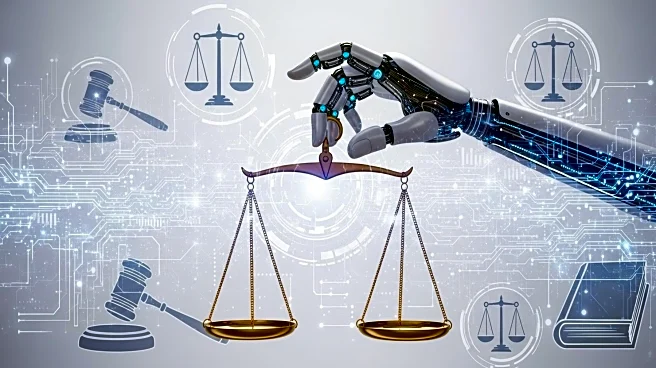What is the story about?
What's Happening?
The integration of AI into legal services is causing significant shifts in the industry, particularly affecting the relationship between corporate legal teams and outside counsel. AI is expected to reorganize the legal services market, altering how legal work is structured, priced, and delivered. This transformation is leading to a bifurcation in the market, with smaller firms leveraging AI for routine tasks and larger firms focusing on high-value, complex matters. The middle market firms face pressure as they struggle to compete with the cost efficiency of smaller firms and the high-prestige work of larger firms. AI is also enabling new entrants, such as accounting firms, to compete in the legal services market by offering cost-effective solutions.
Why It's Important?
The adoption of AI in legal services is crucial as it promises to reduce costs and increase efficiency, potentially lowering law-firm rates by 25%. This shift could democratize access to legal services, allowing smaller businesses to afford quality legal advice previously out of reach. However, it poses challenges for midsize firms that may find themselves squeezed out of the market. The transformation also highlights the need for general counsel to strategically manage outside counsel relationships, balancing cost-effective routine work with premium legal resources. The evolution of legal services due to AI could redefine the industry's competitive landscape, impacting how legal value is perceived and delivered.
What's Next?
As AI continues to reshape the legal services market, firms will need to adapt by embracing AI-enabled platforms that facilitate collaboration and knowledge sharing. This shift may lead to new business models and partnerships, with firms focusing on deep specialization and expertise. General counsel will play a pivotal role in navigating these changes, ensuring that legal departments remain strategic business partners. The ongoing transformation may also see increased competition from non-traditional legal service providers, such as accounting firms, further altering the market dynamics.
Beyond the Headlines
The ethical implications of AI in legal services are significant, as it raises questions about the role of human judgment versus machine efficiency. The credibility gap between traditional firms and clients may widen, with clients demanding transparency and measurable impact from AI adoption. This shift could lead to a cultural transformation within legal teams, as they integrate AI into their workflows and redefine their strategic capabilities.
















